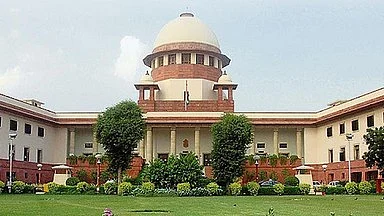Supreme Court stays 5-year religious practice requirement for creating Waqf
Validity of new law has been challenged by several parties, including AIMIM MP Asaduddin Owaisi and Congress MP Mohammad Jawed, among others

15 September 2025
10:54 am: Supreme Court stays provision which says persons practising Islam for last 5 years can only create waqf.
08:40 am: Experts stress that the Waqf (Amendment) Act, 2025 should be seen as a legal reform, not a religious issue.
08:12 am: The Centre argues that creation of waqfs is not an essential religious practice of Islam.
07:45 am: The Supreme Court observes that mandatory registration of waqfs has been in place since 1923, not just after the 2025 amendment.
07:30 am: The Supreme Court is set to deliver its verdict on pleas seeking a stay on the Waqf (Amendment) Act, 2025.
The Supreme Court of India on Monday, 15 September, stayed a controversial provision in the Waqf (Amendment) Act, 2025 that restricted the creation of Waqf properties to individuals who have been practising Islam for the last five years.
The legislation has been fiercely opposed by petitioners, who argue it unfairly targets the Muslim community, even as the Union government has defended it as a step toward curbing misuse of Waqf properties and ensuring greater transparency in their administration.
The Bench, also comprising justice A.G. Masih, reserved its order on 22 May after completing three days of intensive hearings. The matter has been keenly watched since the Act — an amendment to the Waqf Act, 1995 — received presidential assent and came into force on 5 April 2025.
Challenges to the law
The validity of the new law has been challenged by several parties, including AIMIM MP Asaduddin Owaisi and Congress MP Mohammad Jawed, among others. They contend that the amendments are discriminatory, unconstitutional, and strike at the very foundation of an institution that holds deep religious and social significance for Muslims.
Senior advocate Kapil Sibal, appearing for the petitioners, criticised provisions that empower authorities to suspend the Waqf status of a property during an ongoing investigation. He argued such powers are “arbitrary” and violate constitutional protections.
Supporting this contention, senior advocate Rajeev Dhavan underscored the spiritual essence of Waqf in Islamic life. “Waqf is not merely a legal construct but a deeply spiritual and social institution,” he said, citing earlier Supreme Court precedents. Dhavan further argued that no external authority can decide what qualifies as an essential religious practice, a domain reserved for the faith itself.
Centre’s defence
Countering these arguments, solicitor general Tushar Mehta, representing the Union government, maintained that Waqf is not an essential religious practice but primarily involves the secular and administrative regulation of endowed properties. According to him, the amendments were necessary to address widespread misuse and irregularities in the management of Waqf estates across the country.
Background of the case
On 17 April, a Bench led by then Chief Justice of India Sanjiv Khanna had declined to impose an immediate stay on the implementation of the new law. The decision came after the Centre gave an assurance that the most contentious provisions would not be enforced for the time being.
The Waqf (Amendment) Act, 2025, modifies several provisions of the 1995 legislation. It primarily focuses on tightening regulation of Waqf properties — land or assets dedicated under Islamic law for religious or charitable purposes. The government has argued that these changes are essential to ensure accountability and to prevent what it describes as rampant mismanagement of such assets.
What lies ahead
The Supreme Court’s ruling on Monday will determine whether the implementation of the amended law should be put on hold pending a deeper judicial examination of its constitutional validity. A stay could offer temporary relief to petitioners, while a refusal would allow the Centre to proceed, though possibly under judicial scrutiny in the longer term.
With IANS inputs
Follow us on: Facebook, Twitter, Google News, Instagram
Join our official telegram channel (@nationalherald) and stay updated with the latest headlines
